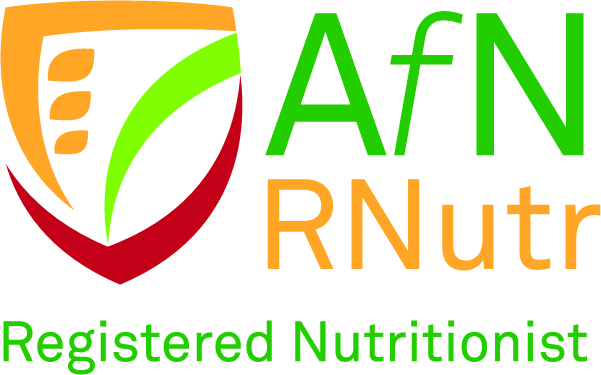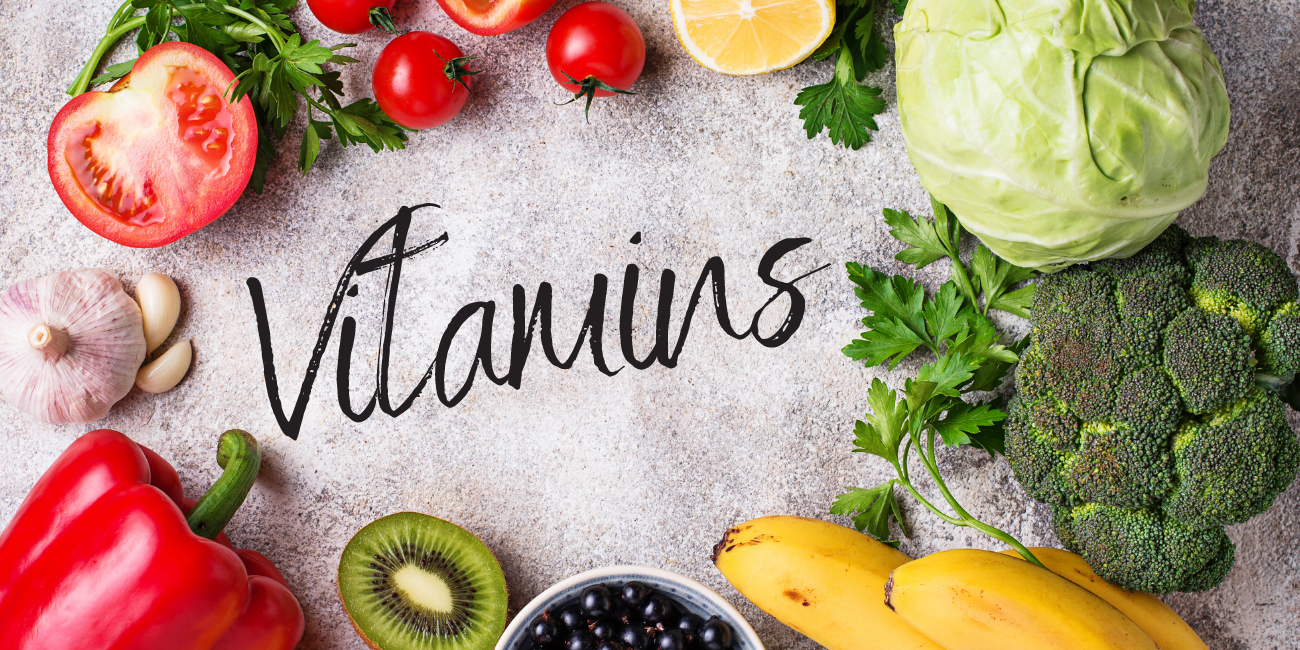Micronutrients – Part 1 – Vitamins
What are they? Why do we need them? And where do we get them from?
Micronutrients are essential nutrients more commonly known as vitamins and minerals. Your body needs these micronutrients, but in smaller amounts compared to macronutrients (carbohydrates, fats and proteins).
I love the way the World Health Organisation describes them as “magic wands”. They enable our bodies to produce enzymes, hormones, and other substances essential for proper growth and development.
Even though we only need small amounts of these “magic wands”, the consequences of their absence can be really severe BUT excess intake is equally harmful.
For many people all the micronutrients needed can be obtained from what we eat and drink, although some are recommended to be taken in supplement form (e.g. vitamin D, specific vitamins for younger kids, plus people who don’t consume all food groups e.g. vegans, vegetarians, and those with specific medical conditions).
As there is lots to go through, I have split this blog into two parts; this one focusing on vitamins and part 2 (coming soon) focusing on minerals.
You will usually see vitamins and minerals expressed as the following 3 units:
- mg – which is a milligram – 1 thousandth of a gram
- μg or mcg – which is a microgram and is 1 millionth of a gram
- IU – which stands for International Units. This is sometimes used for vitamins A, D and E.
Vitamins can also be divided into two groups:
Water soluble vitamins meaning that they dissolve in water and fat-soluble vitamins which need fat to transport them around the body.
Here’s all you need to know about vitamins
Quick Search Contents:
- Vitamin C
- Folate (Folic Acid)
- Thiamin (Vitamin B1)
- Riboflavin (Vitamin B2)
- Niacin (Vitamin B3)
- Pantothenic Acid (Vitamin B5)
- Pyridoxine (Vitamin B6)
- Biotin (Vitamin B7)
- Vitamin B12
- Vitamin A
- Vitamin D
- Vitamin E
- Vitamin K
Water Soluble Vitamins
Unlike fat-soluble vitamins (A, D, E, K), water-soluble vitamins don’t get stored in our bodies. They travel through our bloodstream and if they are not needed, the excess comes out in our urine. Therefore, they need to continually be replaced. If you take expensive supplements whilst having a decent diet, it tends to make pretty expensive wee!
Vitamin C
Vitamin C has many functions including healing skin and protecting cells from oxidative damage. It helps to increase the absorption of iron so it’s often beneficial to combine vitamin C rich foods with iron rich foods.
Adults needs 40mg a day which most people can get through a varied diet. Severe deficiency does occur, but nowadays it is fairly rare, you would need to be deprived of vitamin C for 4-6 months, resulting in scurvy!
Good food sources include citrus fruits (including oranges but this isn’t the highest surprisingly!); fruits and berries (especially blackcurrants); peppers and tomatoes.
Should you consume too much vitamin C from supplements (> 1000mg per day) you could find yourself with stomach pain, diarrhoea and flatulence.
Folate (Folic Acid)
Folate enables red blood cells to form and nerves to function normally, and also reduces the risk of birth defects in unborn babies (such as spina bifida).
Adults need around 200mcg per day, but women who are trying for a baby or are pregnant already should take a supplement of 400mcg folic acid until 12 weeks pregnant (unless advised differently by your GP or health visitor – some people require more).
The terms ‘folic acid’ and ‘folate’ are often used interchangeably, however, folate is a general term used to describe the many different forms of vitamin B9 (the manmade form of folate is called folic acid).
Food sources include green vegetables such as broccoli, peas, brussels sprouts and leafy variants such as cabbage and spinach; brown rice; chickpeas; kidney beans; liver; and some fortified cereals. However, liver should be avoided during pregnancy due to its high vitamin A content (see vitamin A).
Men, and women who cannot get pregnant, should be able to get all their folate needs through a varied balanced diet.
Thiamin (Vitamin B1)
Thiamin helps the body break down and release energy from food, and helps ensure the nervous system stays healthy.
Men need around 1mg and women 0.8mg per day which should be achievable through a varied diet.
Sources include liver, pork, nuts, wholegrain bread, fresh fruit (such as bananas and oranges), peas, fortified cereals and white & brown bread (in the UK white and brown flour are fortified with thiamin, along with calcium, iron and niacin).
Riboflavin (Vitamin B2)
Riboflavin helps release energy from food; helps transport and metabolise iron, and is used for the normal function of mucous membranes and skin.
Men need around 1.3mg and women 1.1mg per day which you should be able to get through your daily diet.
Food sources include milk, egg, mushrooms, plain yoghurt and fortified breakfast cereals.
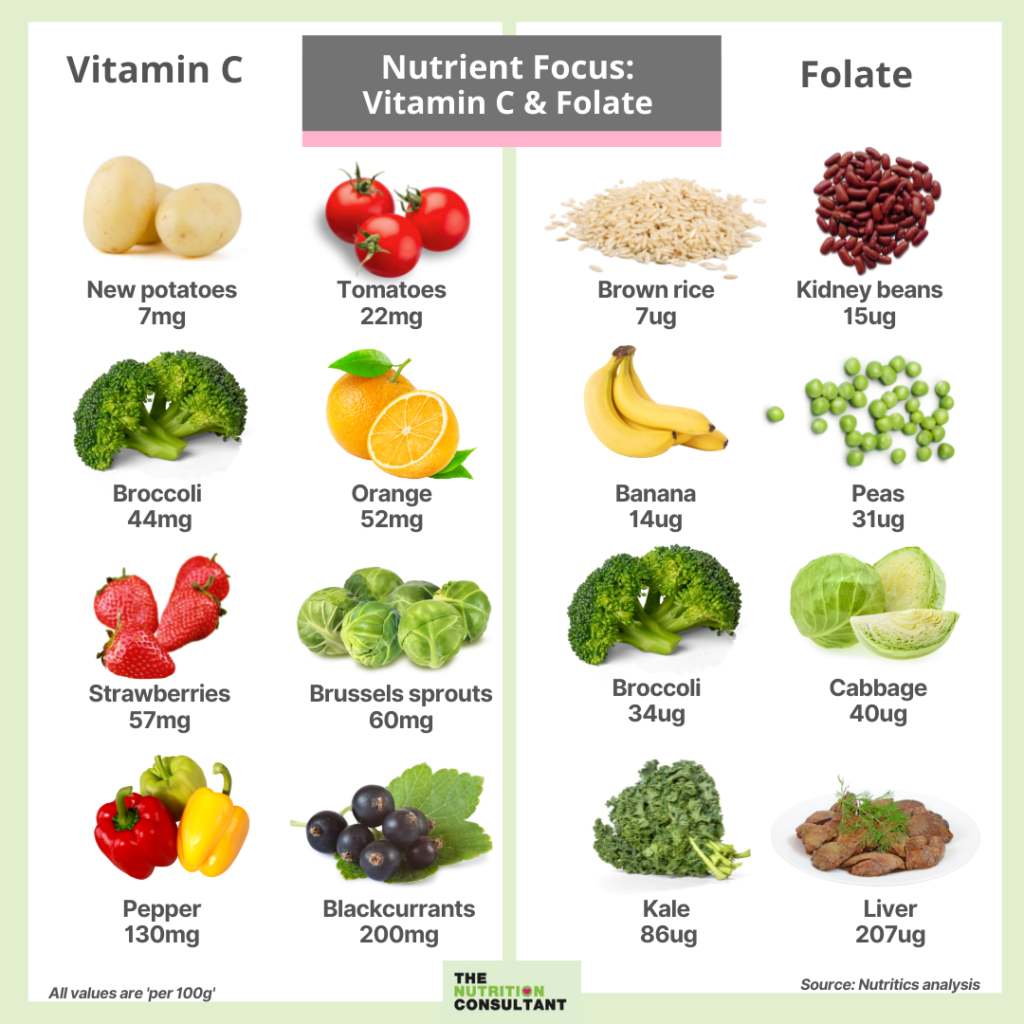
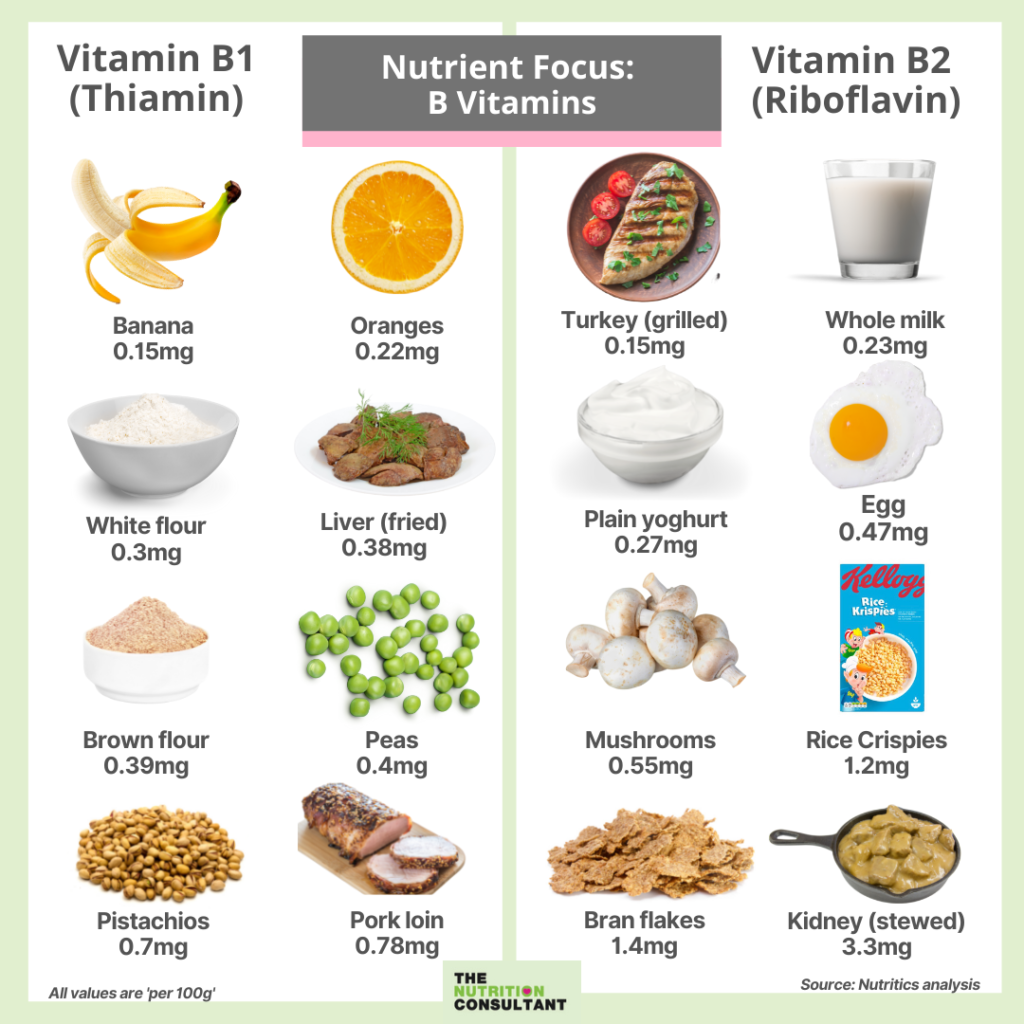
Niacin (Vitamin B3)
Niacin is also used to release energy from food and is required for the skin and nervous system to function normally.
Men need around 16.5mg and women need around 13.2mg per day. By eating a balanced diet, you will get all the niacin you need.
Sources include meat, wheat and maize flour, yeast, fish, eggs and dairy products.
Taking large doses of nicotinic acid supplements can cause skin flushes and if they are taken over a long period of time can cause liver damage.
Pantothenic Acid (Vitamin B5)
Pantothenic acid helps to use the energy from food but interestingly there is no set recommendation for how much individuals here in the UK need.
Good sources are mushrooms, avocados, eggs, chicken and beef.
Pyridoxine (Vitamin B6)
Pyridoxine helps us use and store energy from protein and carbohydrates in our food; plays a factor in forming red blood cells and transporting iron.
Men need around 1.4mg and women 1.2mg per day.
Food sources include peanuts; some vegetables; eggs; whole grains; white fish; soya beans; oats; bananas; milk, pork and poultry. And amazingly, bacteria in your bowel can also create vitamin B6!
Taking too much can lead to a loss of feeling in the arms and legs.
Biotin (Vitamin B7)
Biotin is needed to make fatty acids, but there are no recommendations in the UK due to a lack of evidence to provide guidelines. Biotin is only found in small amounts ins many foods. Like pyridoxine, Biotin can also be made in the gut.
Vitamin B12
Vitamin B12 helps make red blood cells, keeps our nervous system healthy, releases energy from food and helps us use folate.
It’s naturally found in meat, fish, eggs and dairy products and also added (fortified) to some foods such as plant-based milks, cereals and yeast extract (e.g. Marmite).
In general (UK) adults need around 1.5 micrograms per day.
People following a vegan/vegetarian diet or who have allergies to fish, eggs or dairy, may not get enough B12 in their diet and a supplement is usually recommended (B12 status should be checked by your GP).
B12 IV drips and shots are becoming commonplace, however, these are unnecessary unless you are deficient, and it is recommended by your GP.
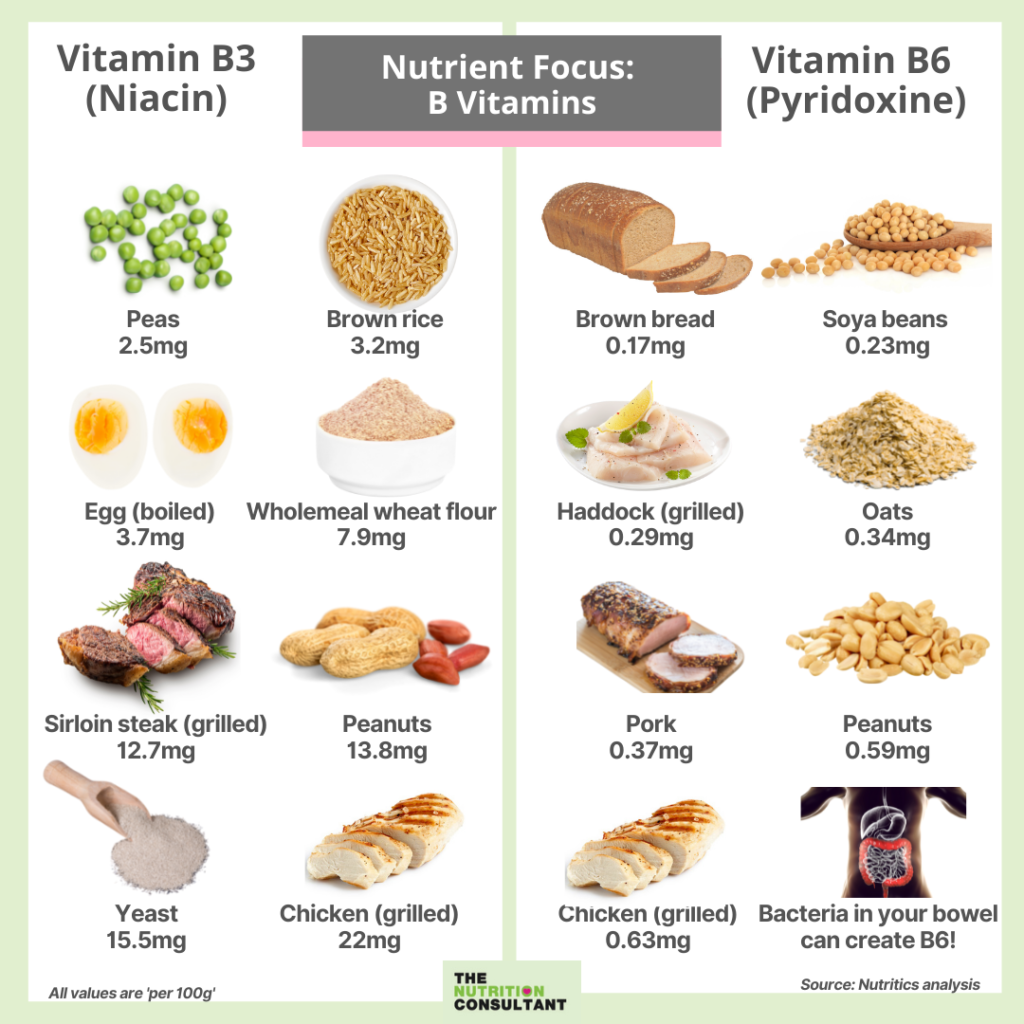
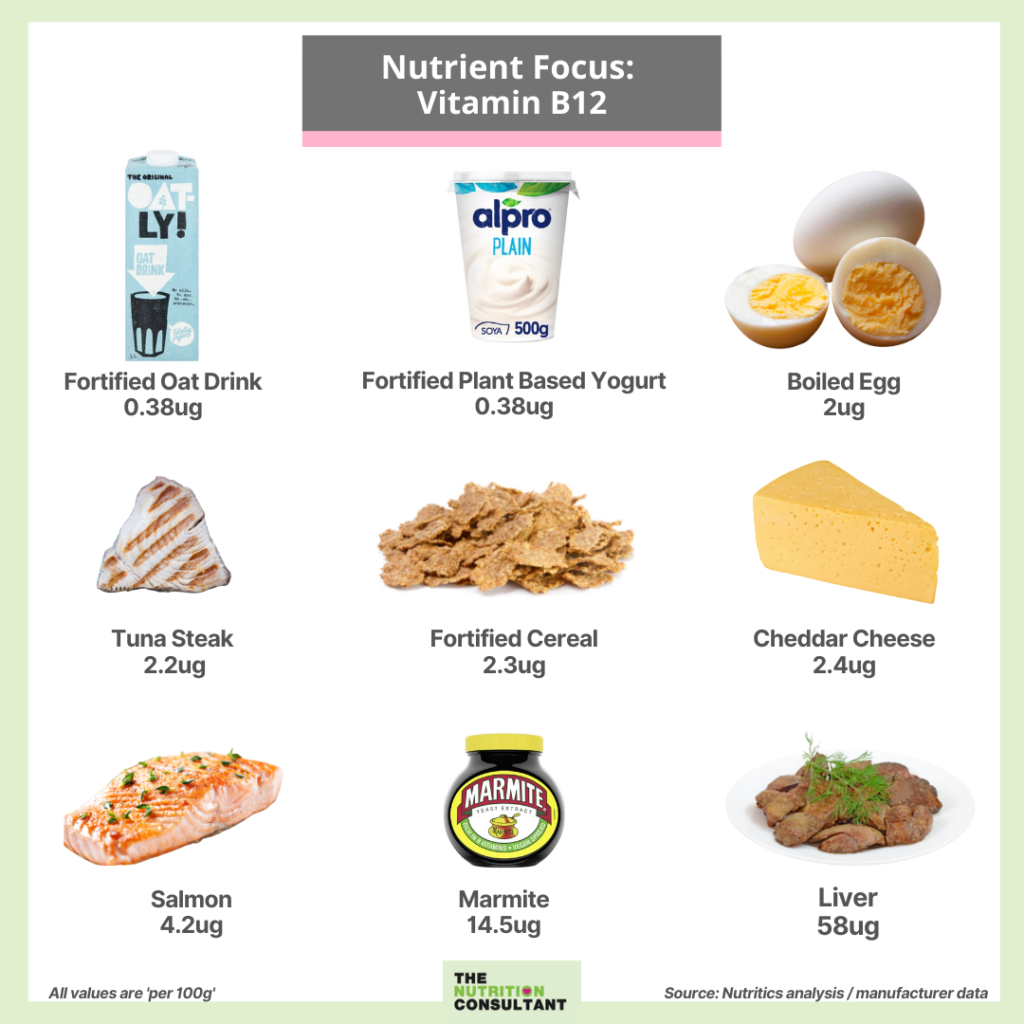
Fat Soluble Vitamins
Fat-soluble vitamins are stored in our body’s fat tissues and in our liver. They generally wait around until they are needed. Some stay a few days, and some are very cleverly stored for many months.
Vitamin A
Vitamin A is essential for the normal structure and function of the skin and really important for the eyes (especially helping night vision), immune system, lungs and our digestive system.
Women need around 700ug and men 600ug per day.
Those who are pregnant (or might become pregnant) need to watch out for vitamin A as too much can harm an unborn baby. This is why supplements containing a high dosage of this vitamin or foods such as liver are not advised in pregnancy.
Other foods high in vitamin A include whole milk, cheese, butter, fat spreads, butter, orange fruits & veg such as carrots and sweet potatoes and dark green leafy veg.
In the UK, low intakes are relatively common in children. This is why government recommends all children between six months and five years take a supplement containing vitamin A (together with C and D) or from 6 months for infants that receive breast milk as their main drink.
If vitamin A is taken in excess (1.5mg / 1500mcg) there is some evidence to suggest that it may weaken the bones. Taking supplements or consuming liver/liver pate more than once a week may increase your chances of getting too much.
Vitamin D
Vitamin D is made under our skin and helps our body function by working with calcium and phosphorus to keep our bones and teeth healthy.
Some foods provide us with vitamin D but most of our stores come from the sunshine in the spring and summer months.
It’s not actually a vitamin at all, it’s a hormone but is commonly known as a vitamin and much easier to explain.
Foods that contain vitamin D include oily fish, cod liver oil, milk, eggs, meat, butter and fortified breakfast cereals.
In the UK everyone >1yrs are advised to take a 10mcg supplement of vitamin D every day in the autumn and winter months. Some people need this all year round – check out the NHS website for the latest info.
Taking too much vitamin D over a long time causes a build-up of calcium which can damage the kidneys and heart and cause weak bones.
Vitamin E
Vitamin E enables our bodies to maintain healthy skin and eyes as well as helps to strengthen our immune system against illness and infection.
Men need around 4mg per day and women around 3mg.
Sources include plant oils, sunflower seeds, almonds, hazelnuts and wheatgerm (found in cereals).
Vitamin K
Vitamin K is used for blood clotting, ensuring wounds heal and there is some evidence that it may help to keep bones healthy.
Adults need 1mcg a day for each kilogram of body weight e.g. if you weigh 75kg you would need 75mcg per day.
It can be found in green leafy vegetables, vegetable oils, cereal grains and in small amounts in meat and dairy foods.
In the UK, babies are normally given an injection of vitamin K after birth. This is to help prevent a rare bleeding disorder in newborns.
Your body will store any ‘fat-soluble’ excess not used and keep it until it is needed. You should be able to get enough from your diet, however, if you do take a supplement make sure you don’t take too much as this could be harmful.
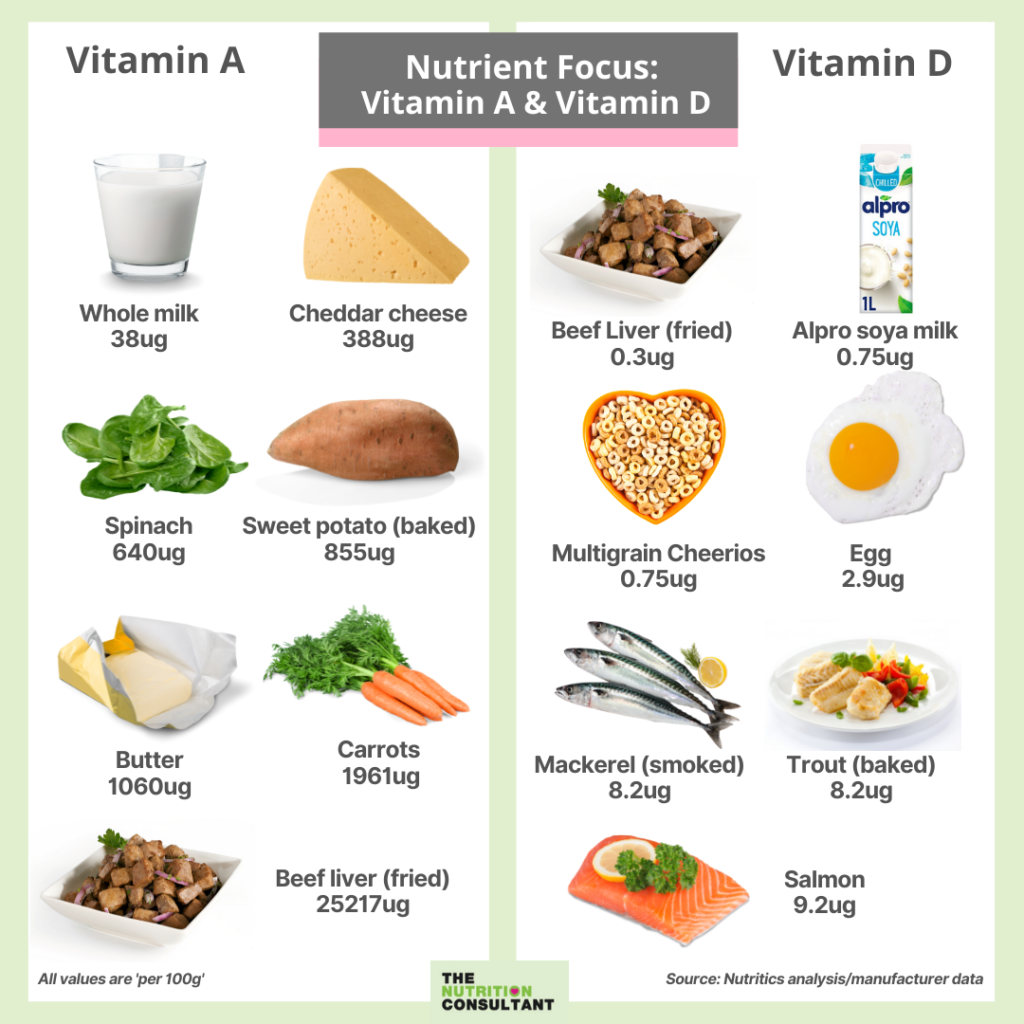
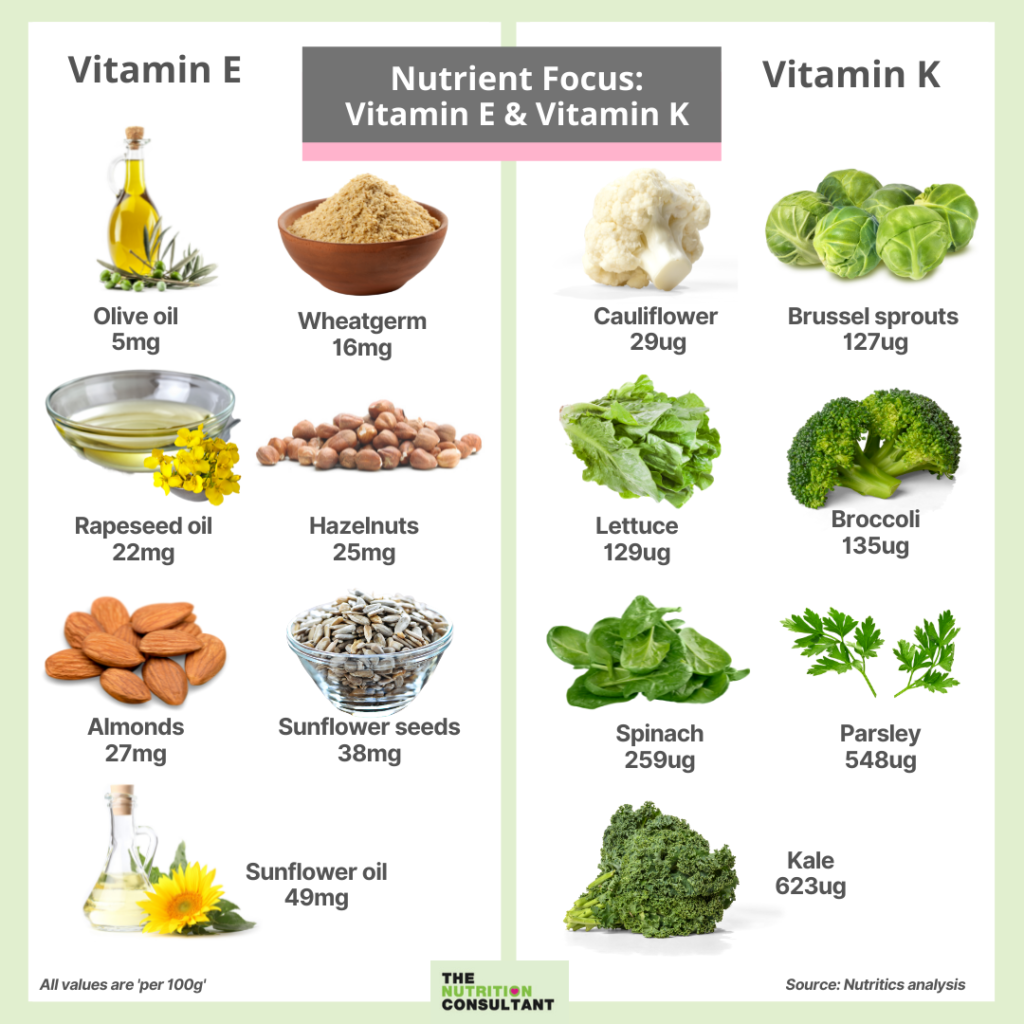
Summary
Everything I have shared in this blog is based on average UK population data, but it is important to note that some people may need more than the average, and some people may need less.
Generally, most people can get all the vitamins they need through their diet. However, if you exclude entire food groups from your diet (e.g. meat or dairy), then it is generally recommended you take specific supplements to minimise the risk of deficiency. Please speak with your GP or other health professionals for personal advice.
Stay tuned for Part 2 of this blog which focuses on minerals.
